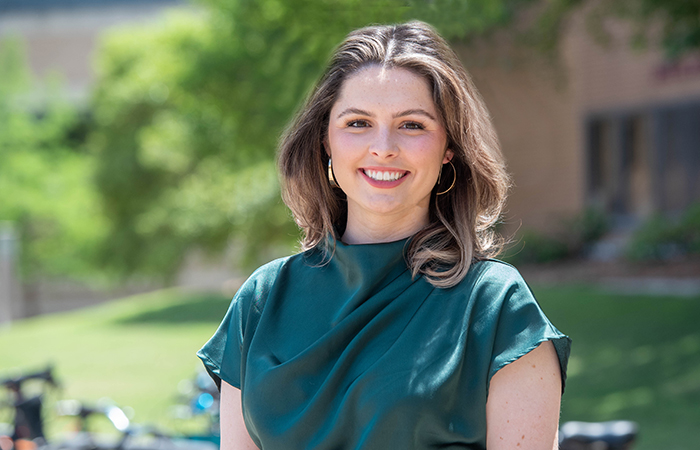School of Public Health student elected Texas A&M graduate and professional student body president
Occupational health and safety graduate student Hannah Payne aims to make a difference in Aggieland and beyond
Hannah Payne ’22 ’24 will serve as Texas A&M University’s graduate and professional student body president for the 2023-24 school year. She is the first student from the School of Public Health elected to this role, which represents the university’s 15,000 graduate and professional students.
Payne decided to seek this position because of her desire to serve others while also galvanizing Aggie graduate and professional students. “As graduate and professional student body president, there’s more access to teams and funding to make projects happen and you get more of a reach in your network,” she said. “I’m so happy to represent the students and university and see what we can achieve in this role.”
Finding her path
Payne always seemed destined to be an Aggie. “Like a lot of other Aggies, I always wanted to go to school here,” she said, adding that she avidly listened to people who described how Texas A&M positively shaped their personal trajectories. “I thought, ‘Wow, I’ve got to be there.’”
Her college decision was sealed when Payne, then in high school, joined her family in participating in a beekeeping conference on Texas A&M’s campus. “We drove around campus for the first time,” she said. “I couldn’t believe how big the campus was. There were so many opportunities, and it was so overwhelming how many things you could do and who you could become. I knew right then and there that there was no other place for me.”
Already considering a career in health care, Payne found that studying occupational health resonated with her experiences growing up in Batson, Texas, which has a large population of blue-collar workers.
“Unfortunately, I saw a lot of people being hurt or dying in accidents that could have been easily prevented if somebody had ensured that proper safety standards were met,” she explained. “I learned that occupational health and safety is how you can be part of the solution and solve those problems. People don’t have to have these unnecessary injuries. A lot of things that happen to people can be prevented.”
As an undergraduate, Payne also served as the senior class president during the 2021-22 academic year. “As senior class president, I got to plan Aggie traditions, but I wanted to take the role to a new level,” she said.
She used her role to spearhead additional opportunities for students, including coordinating a LinkedIn or Locked Out project, where students were able to network, learn how to use LinkedIn, and get a professional headshot. Payne also helped facilitate an Aggie Mental Health Day that connected students to resources on campus and provided students with a fun and relaxing event. Her efforts also extended to helping Aggies serve the area community. She organized Bags by Ags, in which students created more than 200 care kits that were distributed at Twin City Mission’s Homeless Shelter.
Mastering occupational health
As she neared finishing her bachelor’s degree, Payne realized that she wanted to continue to extend her academic exploration of occupational health and safety.
“I saw that there was a real value in getting a master’s degree and being able to take that learning a step forward and develop those professional skills that the master’s program offers here,” she said.
For example, Payne is one of five School of Public Health students who received a grant from the National Institute for Occupational Safety and Health. The grant funds provide financial support to attend school and the opportunity to work with faculty in the Ergonomics Center’s research programs that analyze workplaces such as the GMC plant in Arlington, Texas.
“We evaluate why we are doing this job, how can we change this job or how we can ease the physical strain, whether that’s job rotation or changing the task altogether, or eliminating the task,” Payne said. “It’s really about asking ‘why’ about five times to really figure out how to solve an issue.”
With one year left in graduate school, Payne’s contemplating her career path, which could include working in industry or pursuing a law degree to focus on occupational law. Yet she knows that Texas A&M has laid a strong foundation for her to succeed.
“These invaluable experiences have made me the person that I am today, and they have taught me so much,” she said. “They’ve prepared me to take on the world and do whatever I want to do. My time at Aggieland means everything to me.”
